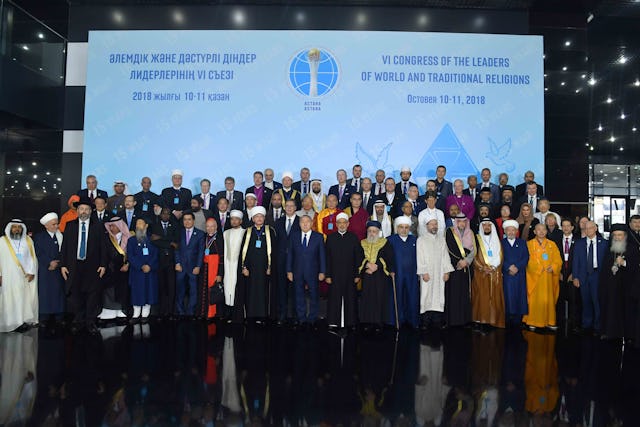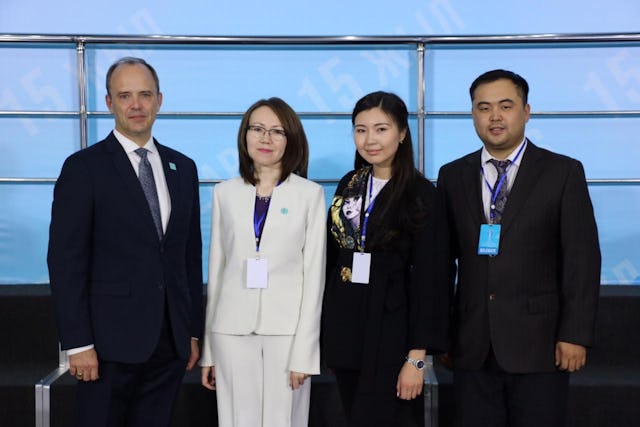Overcoming prejudice and intolerance essential for a safer world
ASTANA, Kazakhstan — Faith communities can contribute to a safer world by combating religious prejudice and intolerance.
This message was at the heart of the Baha’i contribution to the 6th Congress of the Leaders of World and Traditional Religions, held on 10 and 11 October in Kazakhstan’s capital city.
“There has not been a time when humanity has needed greater unity and cooperation,” explains Lyazzat Yangaliyeva, a representative of the Baha’i community at the Congress. “It is very timely for a forum that seeks to promote the unity of religions and orients a dialogue between religious leaders toward the betterment of the world.”
“The Baha’i contribution here focused on one of the major causes of division in the world today—religious prejudice.”
In his presentation at a panel on religion and globalization, Baha’i International Community Secretary-General Joshua Lincoln called to mind the current challenges facing humanity. “As any glance at the news will confirm, the nature and future of globalization are uncertain. This week alone, we have received dire warnings from the Intergovernmental Panel on Climate Change and the International Monetary Fund about the ecological and financial future of the planet.”
Overcoming barriers to cooperation is essential for progress, he asserted. “The Baha’i writings warn of the dangers of religious fanaticism and hatred. Religious beliefs should never be allowed to foster the feelings of animosity among people.”
“Two concepts that are essential for addressing religious prejudice are dialogue and moral education,” explains Ms. Yangaliyeva. The Baha’i contribution at the Congress focused on these two themes.
“The root cause of religious prejudice is ignorance,” she continues. “We emphasized how ignorance is addressed through education that raises moral standards, eliminates prejudice, empowers young people to assume their rights and responsibilities in society, promotes a patriotism that recognizes the oneness of humanity, and finally, focuses on service to family, community, and humanity.”
In the panel presentation, Dr. Lincoln spoke about how dialogue must go beyond present patterns of protest and negotiation. “Oppositional debate, propaganda, and systems of partisanship that have long existed are all fundamentally harmful to the task of searching for the truth of a given situation and for the wisest choice of action. The individual participants must instead aim to rise above their respective points of view, to function as members of a body,” he explained.
The conference included two plenary sessions and several panel discussions. Also, in their capacity as religious leaders, the attendees signed on to a 23-point commitment.
The four-person Baha’i delegation included two other representatives of Kazakhstan’s Baha’i community, Askhat Yangaliyev and Serik Tokbolat.
“It has been uplifting for the Baha’i community of Kazakhstan to be able to participate for the second time in this Congress,” reflected Ms. Yangaliyeva afterward. “We noted with appreciation how each faith community was treated with dignity and respect and interacted in a spirit of harmony and fellowship.”
The triennial Congress, organized by Kazakhstan’s government and hosted by President Nursultan Nazarbayev, was attended this year by 82 delegations from 46 countries, representing a diverse range of religions and nationalities. Kazakhstan Senate Chairman Kassym-Jomart Tokayev chaired the proceedings. The next congress will be held in 2021.

